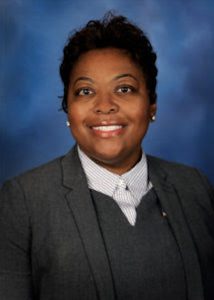GOP challenges former 114th District Rep. Greenwood’s nominating petitions
By Bill Dwyer for Chronicle Media — December 29, 2023
LaToya Greenwood

Wavey T. Lester
As LaToya Greenwood works to reclaim the 114th District House Rep. seat she lost in an upset last year, she is facing an effort to block her from the March 19 Democratic primary ballot.
Greenwood, a former East St. Louis City Councilwoman who holds a master’s degree in public administration and policy, won more than 57 percent of the vote in each of her first three Illinois House races, but managed just 47 percent in 2022 against challenger Kevin Schmidt, a Milstadt chiropractor.
On Dec. 10, Wavey T. Lester, a Republican and former candidate for State Senator from Milstadt, filed a formal objection to Greenwood’s candidate nominating petitions with the Illinois State Board of Elections.
The ISBE will schedule a formal hearing on Lester’s allegations and a decision will be handed down by Jan. 11.
Lester, an announced presidential elector candidate for Nikki Haley, alleged that Greenwood’s 97 sheets of nominating signatures “demonstrate a pattern of fraud and disregard for the Election Code to such a degree that every signature on every sheet purportedly circulated by said individuals are invalid … .”
A total of more than 770 signature lines were challenged as either fraudulent or otherwise improper. The 97-page “recapitulation” section in Lester’s challenge alleges that more than 240 signatures were “not genuine,” and “appear to be written in the same hand.” More than 310 were allegedly from people not living at their registered address, and some 173 signers allegedly lived outside the 114th District. Another 40-plus signatures were flagged for missing or incomplete addresses.
While losing 770 signatures would not be adequate to knock Greenwood off the ballot, Lester also alleges that 53 of the 97 petition sheets she filed with the ISBE were not actually circulated by the person who signed as circulator on the page.
Lester alleges that Greenwood herself, as well as five other petition circulators, are not the actual circulators of various petition sheets, and did not “witness the signatures that appear on her petition sheets, and (were) not present at the time such signatures were purportedly made on her petition sheets … .”
Greenwood, he said, “is not the true circulator” of 16 petition sheets, and five other people who signed another 37 sheets were alleged to not be the actual circulators. With as many as 20 signatures per page, more than 1,000 signatures could potentially be disqualified en masse.
The total effect of the alleged violations, Lester said, was that the number of legally valid nominating signatures “is below the statutory minimum of 500.”
Any ruling by an ISBE hearing board invalidating signatures on Greenwood’s petitions would need to throw out more than two-thirds of the signatures collected. Greenwood’s campaign filed nominating petitions in early December with the ISBE. A scroll through the 97 pages and a quick count of the signatures indicates her campaign gathered approximately 1,660, which is more than three times the number needed to qualify for the primary ballot.
The Illinois GOP was quick to jump on the challenge, and what it alleges is “a pattern of fraud.” Posting on both the organization’s website and on the former Twitter website (now “X”) on Dec. 11, over the background “Fraud Alert” in large red capitalized letters, the GOP bannered “Pattern of fraud in Metro East alleged in signature objections.”
“Former Illinois State Representative LaToya Greenwood’s reelection effort is hitting a roadblock as her petitions are being challenged following a history of fraud in the area surrounding fake signatures on official election documents,” the post read.
Prior to the text of his petition challenge being released publicly, Lester posted a link to the Illinois GOP’s press release, and also opined on the issue on his campaign Facebook page.
The “history of fraud” referred to in the Illinois GOP press release refers to allegations last year by Illinois GOP chairman Don Tracy. He publicly raised concerns over suspected forged write-in ballots in the June 28 Democratic Party Primary in Madison County, after election judges from both political parties reportedly observed suspicious signatures on write-in ballots in a sub-circuit judicial contest.
At that time, 39 ballots were pulled from the counting and impounded. Madison County State’s Attorney Thomas Haine requested a special prosecutor, and the issue was referred to Illinois Attorney General Kwame Raoul’s office. In August 2022, Raoul’s office initiated an investigation, and in October Tracy called for the investigation to be completed and results publicly released prior to the Nov. 8, 2022 general election.







